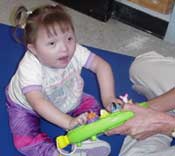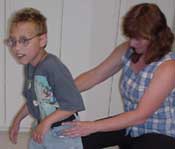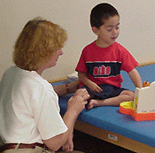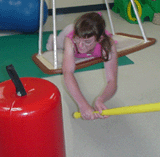CCS Medical Therapy Program (MTP)
Welcome to the CCS Medical Therapy Program (MTP)

The MTP provides occupational and physical therapy to children (birth to 21 years) with certain physical conditions or diseases. These are physical problems that affect the child's ability to control the movements of the body. Examples include cerebral palsy, muscular dystrophy or congenital orthopedic abnormalities. The therapy services are offered at two Medical Therapy Units (MTU) which are based at Duncan Holbert School in Watsonville and a Santa Cruz (Live Oak) location. All services are provided free to families whose child has a medically eligible condition or disease. The purpose of the MTP is to promote the greatest possible physical independence in eligible children.
The Medical Therapy Program is a coordinated program of medically necessary Physical Therapy (PT) and Occupational Therapy (OT) services provided to medically eligible children. PT and OT may help your child to be independent in such areas as getting around, getting in and out of a wheelchair, walking, feeding, dressing, staying clean and neat, and home skills.
What are the financial eligibility criteria for the CCS Medical Therapy Program?
There is no income limitation for MTP services. While a family might be over income to receive other CCS services, the child may be considered "MTU-only" and receive therapy services at the MTU as long as they have an MTP eligible condition.
What are the medical eligibility criteria for the Medical Therapy Program?
These are general guidelines that the CCS Medical Director applies during the individual review of each child referred to the MTP. The State CCS Office has established more detailed criteria. Eligibility is generally accepted if a child meets one of the following conditions:
the MTP. The State CCS Office has established more detailed criteria. Eligibility is generally accepted if a child meets one of the following conditions:
- The child has been diagnosed with cerebral palsy.
- The child has been diagnosed with muscular dystrophy, polio, myasthenia gravis or a similar condition, that produces weakness or atrophy.
- The child has been diagnosed with a chronic musculoskeletal or connective tissue condition such as osteogenesis imperfecta, arthrogryposis or juvenile rheumatoid arthritis.
- The child has limb, muscle, connective tissue or joint abnormalities or contractures resulting in disability or functional impairment. Examples include amputation of a limb or joint contractures due to previous burn injury.
- The child has a neurological condition that manifests the same findings as cerebral palsy, such as ataxia-telangiectasia.
- A child under three years of age who has physical findings suggestive of cerebral palsy but not yet conclusive and who needs therapeutic services.
What types of therapy do children receive at the MTU?
 Each child undergoes an initial physical and occupational therapy evaluation to determine the nature and extent of the physical concerns. The physical therapist (PT) focuses on the large movements of the body, such as rolling, crawling and walking. The occupational therapist (OT) studies the fine movements, such as hand and facial control. They work together to develop a Treatment Plan that meets the needs of the child & family and collaborates with all other services a child is receiving. Eligible children and their families receive consultation for activities that promote physical development outside of the MTU. Children are monitored for the progression of their physical development over time. Some children come to the MTU regularly (1-2 times week on average) to work directly with one or both therapists on specific activities. Frequency and specifics of treatment activities depend upon identification of functional goals by the rehabilitation team. Many children only need to be seen infrequently, to monitor bracing and equipment needs.
Each child undergoes an initial physical and occupational therapy evaluation to determine the nature and extent of the physical concerns. The physical therapist (PT) focuses on the large movements of the body, such as rolling, crawling and walking. The occupational therapist (OT) studies the fine movements, such as hand and facial control. They work together to develop a Treatment Plan that meets the needs of the child & family and collaborates with all other services a child is receiving. Eligible children and their families receive consultation for activities that promote physical development outside of the MTU. Children are monitored for the progression of their physical development over time. Some children come to the MTU regularly (1-2 times week on average) to work directly with one or both therapists on specific activities. Frequency and specifics of treatment activities depend upon identification of functional goals by the rehabilitation team. Many children only need to be seen infrequently, to monitor bracing and equipment needs.
What is the Medical Therapy Clinic (MTC)?
Many of the children who receive therapy services are offered an opportunity to come to the MTC. The Clinic Team includes a Pediatrician, an Orthopedist or Physiatrist, the CCS Supervising Therapist, the child's treating therapists and CCS Case Management personnel. This group seeks to affirm with the family the child's diagnosis and Treatment Plan. It also seeks to understand how CCS MTP services fit with the family and other professionals involved with the child.
What are the steps in the application process to obtain MTP services?
To receive services, a family must complete an intake process with CCS. A team, including the Medical Director, Supervising Therapist and CCS caseworkers, gathers information from the family and child's physicians to determine eligibility. The intake process includes the following steps:
Supervising Therapist and CCS caseworkers, gathers information from the family and child's physicians to determine eligibility. The intake process includes the following steps:
- Initial referral by hospital, physician, community organization or family.
- The family submits application.
- The hospital or physician submits medical records to CCS.
- CCS Medical Director reviews and determines medical eligibility.
- CCS informs the family of the child's eligibility.
- CCS sends a letter to the child's physician regarding eligibility.
- CCS initiates the initial evaluation at MTU for the medically eligible child.
What is the parents or caregiver's role in the medical therapy?
The parents' active participation in their child's care and treatment is vital, especially when treatment maay be needed over a long period of time. Actual changes cannot usually be expected to occur solely as a result of weekly, biweekly or monthly therapy sessions, but rather are fostered by follow-up of a child's therapy program in the classroom, at home and in the community.
Some areas where parent participation is needed:
- Attending regular therapy appointments with the child and calling to cancel when unable to attend.
- Carrying out a home program.
- Sharing concerns and expectations.
Parents are encouraged to use other agencies and resources to provide services not covered by CCS. As the child grows and their therapy needs change, the method of management will reflect the appropriate changes. There may be changes in the amount of therapy provided, or a change in emphasis from gross motor needs to fine motor, academic and language skills, or a shift of focus from therapy to classroom consultation and home programs with periodic monitoring by the CCS therapy staff.